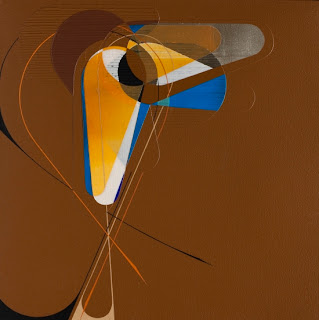ABOUT DANIELLE FOUSHEE
I am an artist. This website features my work and highlights some of the varied
Wednesday, January 19, 2011
Alex Couwenberg & Wabi Sabi
I recently came across these abstract paintings by Alex Couwenberg. His work is heavily influenced by his Dutch-Indonesian heritage. He grew up in California, and you can see the obvious Californian character of his paintings.
These paintings remind me of the work of Rex Ray, another contemporary California artist whose work I admire. I love the graphic qualities of these works, as well as the slightly sickly color palettes. I'm reminded of 1950s surface patterns, maybe textiles, wallpaper, or linoleum.
There’s an appealing tension in these paintings—maybe something uncontrolled, something undesired being swept under the rug. It’s a kind of forced order that seems a bit out of order (if you know what I mean).
His newer works are becoming more and more mechanical, more precise—they look almost computer generated. I would like to see them in person sometime... When I look closely, I think I see textures on the surface of the paintings that don’t come across well in the photos. I hope so, because I really like the idea of the artist attempting to control something that is inherently uncontrollable. Personally, I like to see evidence of the artist’s hand in his/her work... there’s just something more authentic, perhaps closer to the spirit (at least for me) when a work of art is flawed in some way.
I think my desire to see evidence of the artist’s process is residue from my experiences working digitally for so long as a professional graphic designer. In my best (favorite) graphic design work, I try to incorporate evidence of physical processes, through hand-painted textures, scanning in objects/textiles, or simply by designing elements to be purposefully slightly off-kilter.
I’m newly intrigued by the Japanese concept of “wabi-sabi.” According to Richard Powell in his book Wabi Sabi Simple: “[Wabi-sabi] nurtures all that is authentic by acknowledging three simple realities: nothing lasts, nothing is finished, and nothing is perfect.” I think I will be studying this idea more in-depth very soon. According to my limited research so far, it appears that this concept is mirrored in Native American and ancient Indian cultures as well. Stay tuned—I think I’ll be returning to this line of thought in future posts.
Labels:
Inspiring Artist




